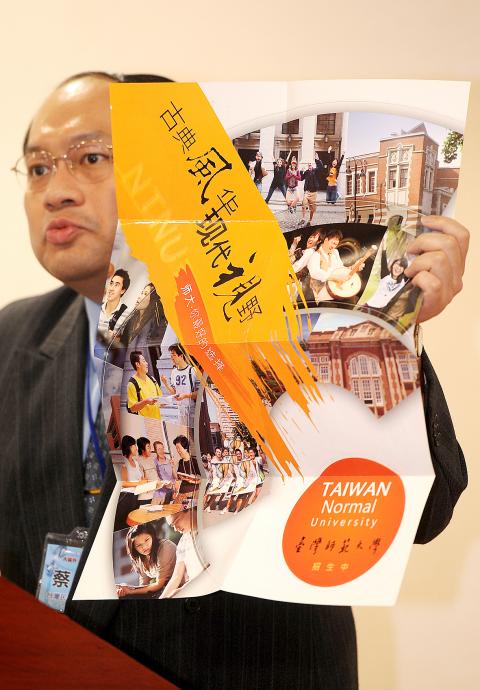A Taiwanese public university yesterday confirmed at a forum on cross-strait affairs that it had changed its name in an effort to attract more Chinese students, while a Chinese academic dared Taiwan to join an “experiment in democracy” in China.
National Taiwan Normal University (NTNU) has made extensive efforts to attract Chinese students, who will be allowed to enroll starting in September, NTNU professor Tsai Chang-yen (蔡昌言) said at the Cross-Strait Competitiveness Forum organized by the National Competitiveness Forum think tank.
In the school’s promotional posters and application brochures in simplified Chinese, the word “national” is not included in the school name, a move to demonstrate “goodwill” to China, Tsai said as he showed the poster to the audience.

Photo: Liu Hsin-de, Taipei Times
Speaking earlier, Mainland Affairs Council Deputy Minister Chao Chien-ming (趙建民) attributed what he called Taiwan’s loss of national competitiveness to the “mishandling of cross-strait relations,” without elaborating.
Chao accused former president Lee Teng-hui (李登輝) of “taking the nation in the wrong direction since the middle of the 1990s,” about the time when Lee put political identity above economic development and everything else.
Taiwan spent too much energy on “meaningless activities” during that period, Chao said.
Meanwhile, Li Minrong (李閩榕), director of the Development Research Center under the Fujian Provincial Government, raised eyebrows, when he said that political systems can be experimental, adding that a project could be launched in Pingtan, Fujian Province, to encourage bilateral cooperation on economic affairs.
“Since Taiwan has always been proud of its democratic system, China is open to a ‘political experiment’ at Pingtan Park. We [China] dare Taiwan to join the experiment,” Li said.
Democracies in the West and the East differ in form and character because of the difference in culture and background, Li added.
National Competitiveness Forum chief executive Hsieh Ming-hui (謝明輝) focused on a potential meeting between President Ma Ying-jeou (馬英九) and Chinese President Hu Jintao (胡錦濤).
“If re-elected in January, Ma is expected to accelerate cross-strait engagement in his second term to achieve a ‘breakthrough’ in bilateral relations,” Hsieh said.
With Hu scheduled to leave office in November next year, “the best time for the two leaders to meet falls between Taiwan’s presidential election and Hu’s departure,” Hsieh said.
The Ma-Hu meeting would be a new start for cross-strait relations and a catalyst for ensuing developments, such as a peace accord or a military confidence-building mechanism, he said.
Meanwhile, in a surprise move, Wang Teng-kun (王騰坤), an assistant professor at National Chung Cheng University and deputy director of the Chinese Nationalist Party’s (KMT) youth department, challenged Straits Exchange Foundation Vice Chairman Kao Koong-lian (高孔廉) over his presentation earlier at the conference.
Kao’s briefing on cross-strait relations, Wang said, failed to mention how much Taiwan’s agricultural sector had suffered since the Economic Cooperation Framework Agreement (ECFA) came into force.
In a brief response, Kao brushed off the criticism.

Taiwan is stepping up plans to create self-sufficient supply chains for combat drones and increase foreign orders from the US to counter China’s numerical superiority, a defense official said on Saturday. Commenting on condition of anonymity, the official said the nation’s armed forces are in agreement with US Admiral Samuel Paparo’s assessment that Taiwan’s military must be prepared to turn the nation’s waters into a “hellscape” for the Chinese People’s Liberation Army (PLA). Paparo, the commander of the US Indo-Pacific Command, reiterated the concept during a Congressional hearing in Washington on Wednesday. He first coined the term in a security conference last

Prosecutors today declined to say who was questioned regarding alleged forgery on petitions to recall Democratic Progressive Party (DPP) legislators, after Chinese-language media earlier reported that members of the Chinese Nationalist Party (KMT) Youth League were brought in for questioning. The Ministry of Justice Investigation Bureau confirmed that two people had been questioned, but did not disclose any further information about the ongoing investigation. KMT Youth League members Lee Hsiao-liang (李孝亮) and Liu Szu-yin (劉思吟) — who are leading the effort to recall DPP caucus chief executive Rosalia Wu (吳思瑤) and Legislator Wu Pei-yi (吳沛憶) — both posted on Facebook saying: “I

The Ministry of Economic Affairs has fined Taobao NT$1.2 million (US$36,912) for advertisements that exceed its approved business scope, requiring the Chinese e-commerce platform to make corrections in the first half of this year or its license may be revoked. Lawmakers have called for stricter enforcement of Chinese e-commerce platforms and measures to prevent China from laundering its goods through Taiwan in response to US President Donald Trump’s heavy tariffs on China. The Legislative Yuan’s Finance Committee met today to discuss policies to prevent China from dumping goods in Taiwan, inviting government agencies to report. Democratic Progressive Party Legislator Kuo Kuo-wen (郭國文) said

The Ministry of Economic Affairs has fined Taobao NT$1.2 million (US$36,900) for advertisements that exceeded its approved business scope and ordered the Chinese e-commerce platform to make corrections in the first half of this year or its license would be revoked. Lawmakers have called for stricter supervision of Chinese e-commerce platforms and more stringent measures to prevent China from laundering its goods through Taiwan as US President Donald Trump’s administration cracks down on origin laundering. The legislature’s Finance Committee yesterday met to discuss policies to prevent China from dumping goods in Taiwan, inviting government agencies to report on the matter. Democratic Progressive Party